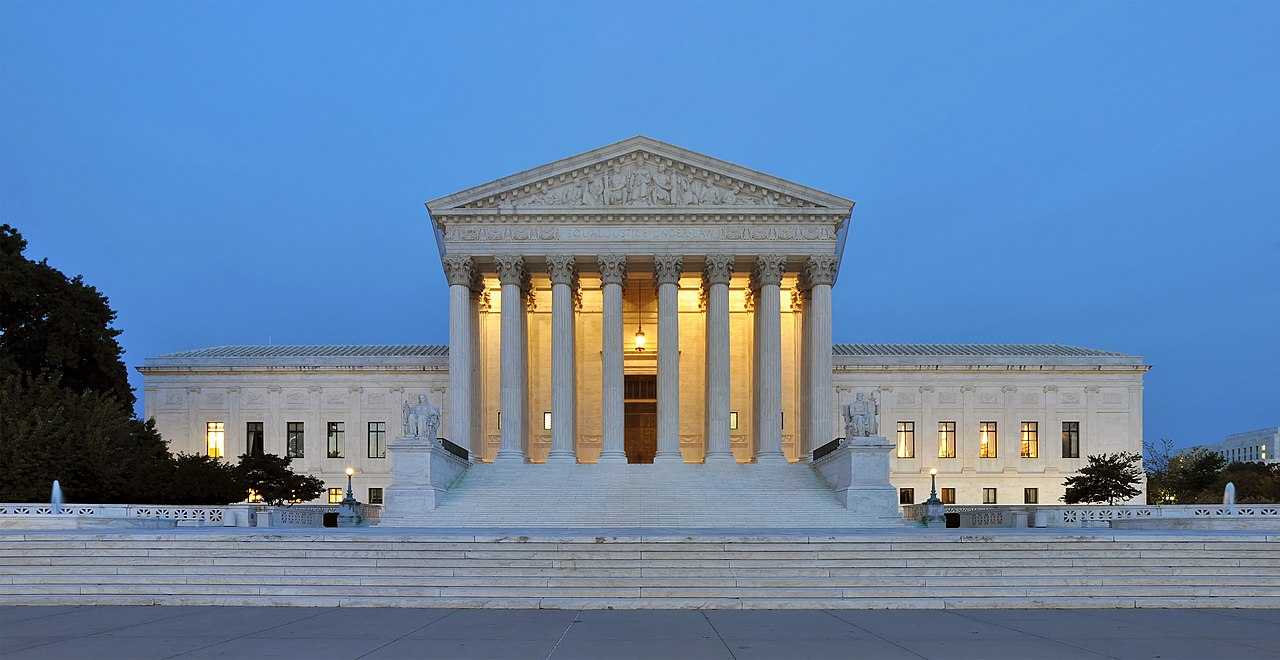More languages
More actions

The Supreme Court of the United States is the judicial branch of the United States. Its members are not elected and have no term limits, serving for life.[1]
History
Samuel Chase became the only Supreme Court justice to be impeached in 1804 but was never removed from office. The number of justices on the Supreme Court has changed six times and has been set at nine since 1869.[2]
Important decisions
Pre-Civil War
In the 1823 case Johnson v. McIntosh, Chief Justice John Marshall ruled that indigenous peoples had no ownership of their land and that only the federal government could own and sell their lands.[3]
In Dred Scott v. Sandford in 1857, the Supreme Court ruled that Black people were "merchandise" and could not sue for their freedom from slavery.[4]
Civil War to civil rights movement
In 1903, in Lone Wolf v. Hitchcock, the Supreme Court ruled that Congress and the Bureau of Indian Affairs could manage native land and resources even if they were reserved to native nations by treaties.[5]
In 1905, the Supreme Court ruled that New York could not prevent bakers from working a 10-hour day in Lochner v. New York.[6]
In the 1944 case Korematsu v. United States, the Supreme Court ruled that President Franklin Roosevelt's internment of over 100,000 Japanese immigrants was constitutional.[4]
Post-civil rights movement
In 2005, the Supreme Court ruled against the Oneida nation and rejected their claim to land that George Washington guaranteed them in 1794 with the Treaty of Canandaigua.[7]
In March 2022, after the CIA tortured Abu Zabaydah at black site in Poland and waterboarded over 80 times, he sent a petition to the Supreme Court asking for the testimony of two psychologists who were at the site. The Supreme Court blocked the testimony, claiming it would reveal "state secrets," and sent Zabaydah to Guantánamo Bay concentration camp, where he remains today.[8]
In June 2022, the Supreme Court ruled 6-3 to overturn Roe v. Wade, allowing U.S. states to ban abortion. 72% of the U.S. population opposed overturning Roe v. Wade.[1] The Supreme Court has also threatened to ban gay marriage[9] and contraception.[10]
References
- ↑ 1.0 1.1 Party for Socialism and Liberation (2022-06-24). "PSL statement: Supreme Court eviscerates abortion rights, the time to fight back is NOW!" Liberation News. Archived from the original on 2022-06-28. Retrieved 2022-06-30.
- ↑ Walter Smolarek (2022-12-04). "Civics class for radicals: The Supreme Court" Liberation News. Archived from the original on 2022-12-06. Retrieved 2022-12-07.
- ↑ Richard Becker (2023-04-02). "Vatican renounces ‘Doctrine of Discovery.’ When will Supreme Court do likewise?" Liberation News. Archived from the original on 2023-04-03. Retrieved 2023-04-06.
- ↑ 4.0 4.1 Stefanie Fisher (2022-05-02). "The Supreme Court: Last line of defense for the ruling class" Liberation School. Retrieved 2022-07-17.
- ↑ Roxanne Dunbar-Ortiz (2014). An Indigenous Peoples' History of the United States: 'Ghost Dance Prophecy' (p. 189). [PDF] Boston, Massachusetts: Beacon Press. ISBN 9780807000403
- ↑ Chad Pearson (2023-07-12). "Sober Up Liberals: The U.S. Constitution Sucks" MR Online. Archived from the original on 2023-07-12.
- ↑ Richard Becker (2023-04-02). "Vatican renounces ‘Doctrine of Discovery.’ When will Supreme Court do likewise?" Liberation News. Archived from the original on 2023-04-03. Retrieved 2023-04-06.
- ↑ Marjorie Cohn (2022-03-14). "Supreme Court says torture at CIA Black Site is a “State Secret”" Monthly Review. Archived from the original on 2022-03-15. Retrieved 2022-06-29.
- ↑ Eric London (2022-05-06). "The Supreme Court’s ruling on abortion: The spearhead of a massive assault on democratic rights" World Socialist Web Site. Archived from the original on 2022-06-25. Retrieved 2022-06-29.
- ↑ "The Rightwing’s Supreme Court Coup" (2022-06-24). Against the Current. Archived from the original on 2022-06-25. Retrieved 2022-06-29.
